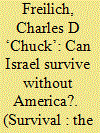| Srl | Item |
| 1 |
ID:
153373


|
|
|
|
|
| Summary/Abstract |
The importance of the United States to Israel’s national security cannot be overstated. Washington is usually the first, and often the sole, port of call for strategic consultation – almost always the foremost one, and inevitably the primary means of addressing the challenges Israel faces. America is the be-all and end-all of most policy deliberations in Israeli national-security decision-making forums. Some four decades into this ‘special relationship’, the price of a truly remarkable partnership has been a significant loss of Israeli independence. Indeed, Israel’s dependence on the US has become so deep that it is questionable whether the country could even survive today without it.
|
|
|
|
|
|
|
|
|
|
|
|
|
|
|
|
| 2 |
ID:
147512


|
|
|
|
|
| Summary/Abstract |
Israel’s security doctrine has traditionally distinguished between routine threats (low-intensity attacks by state armies or non-state organisations) and fundamental threats (high-intensity offensives by state armies). It has paid much less attention to the middle ground: the medium-intensity threat. That threat has grown in the wake of changes to the priorities of some Arab states; reductions in the military capabilities of others; and the emergence of non-state organisations that have acquired some state capabilities and that have successfully combined guerrilla and terror tactics (irregular warfare) with more conventional practices (regular warfare). Indeed, medium-intensity warfare is now the strategic focus of some of Israel’s active enemies. The country’s security doctrine must address this grey area, first by defining it, and then by identifying the optimal strategies and tactics that will be required to combat it.
|
|
|
|
|
|
|
|
|
|
|
|
|
|
|
|
| 3 |
ID:
128844


|
|
|
|
|
| Publication |
2014.
|
| Summary/Abstract |
Tehran's military capabilities do not match its ambitions for recognition and status. It is cautious, defensive and prudent in resorting to force, due as much to experience as to realism about its own limits. Iran has been a source of international concern for decades. Its general hostility to the international system disturbs the regional order. Tehran's initial aim of exporting the 1979 revolution, supplanted later by exporting its revolutionary model, has caused anxiety in smaller, traditional regimes. And the view that it is a belligerent state all too ready to resort to force feeds concern about its nuclear ambitions. This perspective, largely shared by Israel and some members of the Gulf Cooperation Council, is plausible but incomplete. I will argue that by orthodox standards Iran is militarily weak, and cautious, defensive and prudent in resorting to force. This is due as much to experience as to realism about its own limits. The country does not see itself as a military power or aspire to become one, even if some of its utterances and behaviour leave room for scepticism on this point.
|
|
|
|
|
|
|
|
|
|
|
|
|
|
|
|